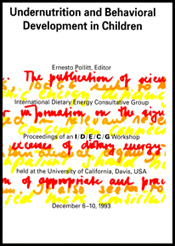 Undernutrition
and Behavioral Development in Children
Undernutrition
and Behavioral Development in Children Undernutrition
and Behavioral Development in Children
Undernutrition
and Behavioral Development in Children
On behalf of the UN ACC-Subcommittee on Nutrition, the International Dietary Energy Consultative Group (I/D/E/C/G) has been established for the study of dietary energy intake in relation to the health and welfare of individuals and societies by the United Nations University. Its specific objectives are:
1. The compilation and interpretation of research data on functional and other consequences of deficiency, change or excess of dietary energy.
2. The identification of related research needs and priorities, and the promotion of needed research.
3. The publication of scientific and policy statements and other information on the significance of chronic deficiencies and excesses of dietary energy.
4. The identification and promotion of appropriated and practical means of corrective action.
I/D/E/C/G Steering Committee:
- Dr. N.S. Scrimshaw, UNU, Chairman
- Dr. J.G.A.J. Hautvast, IUNS
- Dr. B. Schürch, Executive Secretary
THE JOURNAL OF NUTRITION OFFICIAL PUBLICATION OF SUPPLEMENT THE AMERICAN INSTITUTE OF NUTRITION
August 1995 VOLUME 125 Number 8S
THE RELATIONSHIP BETWEEN UNDERNUTRITION AND BEHAVIORAL DEVELOPMENT IN CHILDREN
A Report of the International Dietary Energy Consultative Group (IDECG) Workshop on Malnutrition and Behavior
Guest Editor:
Ernesto Pollitt
This workshop was supported by IDECG, the Nestlé Foundation, Kraft Foods, and the International Union for Nutrition Science.
This supplement to The Journal of Nutrition includes papers prepared for the International Dietary Energy Consultative Group (IDECG) Task Force workshop on malnutrition and behavior at the University of California, Davis, California, December 6-10, 1993. This supplement is the responsibility of the guest editors, to whom the Editor of The journal of Nutrition has delegated supervision of both technical conformity to the published regulations of The Journal of Nutrition and general oversight of the scientific merit of each article. Each article in this section was subject to strict peer review before publication, as are all articles published in The Journal of Nutrition.
The workshop was supported by IDECG, the Nestle Foundation, Kraft Foods, and the International Union for Nutrition Science. The opinions expressed in this publication are those of the authors and are not attributable to the sponsors or to the publisher, editor, or editorial board of The Journal of Nutrition. The costs of publication of this supplement were defrayed in part by the payment of page charges. This publication must therefore be hereby marked "advertisement" in accordance with 18 U.S.C. Section 1734 solely to indicate this fact.
The Relationship Between Undernutrition and Behavioral Development in Children
(J. Nutr. 125: 2211S-2284S, 1995). Copyright (c) 1995 by the American Institute of Nutrition. Copies of this supplement publication may be obtained from the American Institute of Nutrition, 9650 Rockville Pike, Bethesda, MD 20814-3990 for $10.00 per copy prepaid.
The digitalization of this publication was made possible by a grant from the Nestlé Foundation
Malnutrition and the brain: changing concepts, changing concerns1
Historic reasons for suspecting neonatal malnutrition should permanently disrupt cognitive functioning: effects on total size of the cerebrum
Enduring effects of early malnutrition on total brain and cerbral cortex
Functional estimates of changes in brain structure
Further substantiation of enduring changes in neurotransmitter metabolism caused by early malnutrition
Other enduring functional effects of early malnutrition on brain: the hippocampus
Early malnutrition and cerebellar changes
Literature cited
Enduring cognitive effects of early malnutrition: a theoretical reappraisal1
Enduring effects of early malnutrition in animals5
Cognitive effects, independent of altered motivation and/or emotion?
Literature cited
A review of studies of the effect of severe malnutrition on mental developments1
Diagnosis of severe malnutrition
Research considerations
The acute stage of severe malnutrition
Short-term effects of severe malnutrition
The environment of severely malnourished children
Case control studies of survivors of early childhood severe malnutrition
Interpretation of findings
Children's response to an improved environment
Malnutrition in an extremely deprived environment
Malnutrition independent of poor social circumstances
Interactions between severe malnutrition and other nutritional deficiencies
The mechanisms
Literature cited
Specificity of effects
Critical periods
Differential responsivity
Nutrients
Mechanisms
Avenues for future research
Policy implications
Literature cited
Relation of mild-to-moderate malnutrition to human development: correlational studies1
Anthropometry studies
Direct assessment of food intake
Future directions
Literature cited
Malnutrition and behavioral development: the nutrition variable1
Diagnosing malnutrition and identifying populations at risk
Associations and interactions among dietary components
Acknowledgment
Literature cited
Developmental zinc deficiency and behavior1,2
Identifying and characterizing zinc deficiency
Zinc deficiency and altered food intake
Critical periods or behavioral teratology experiments in animals
Concurrent experiments in animals
Developmental/concurrent studies in monkeys
Studies in humans
Mechanisms of zinc deprivation effects on behavior
Caveats for integrating conclusions from animal and human studies
Acknowledgments
Literature cited
Epidemiological characteristics
Iron and development
Weaknesses in design
Literature cited
Human milk and breast feeding for optimal mental development1
Essential fatty acids and brain development: docosahexaenoic acid
Mental development in breast-fed infants
Literature cited
Policy implications of new scientific knowledge1
Literature cited